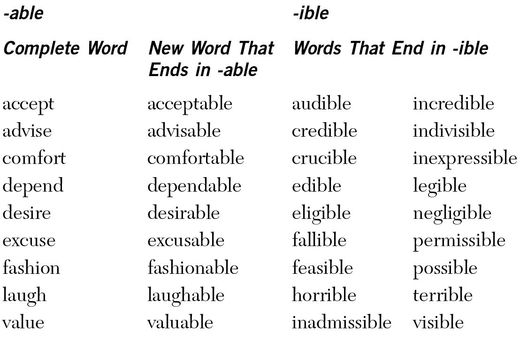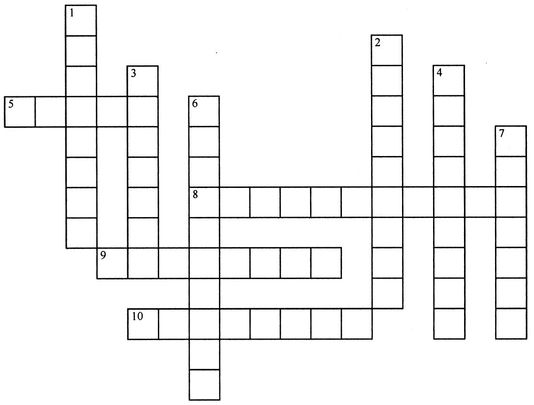Chapter 10
Rule Your Vowel Movements

President Andrew Jackson stated, “It’s a dam pur mind that can only think of one way to spell a word.”
Well, he sure had no trouble, eh? What’s with this pur stuff? In this chapter, I’ll share some spelling rules that can help you learn how to spell the words you need only one way—the correct way.
For instance, in chapter 4 you learned:
I before e
Except after c
Or when sounded as a
As in neighbor and weigh
Except after c
Or when sounded as a
As in neighbor and weigh
A good rule, that, but you also learned that a handful of words don’t follow the rule. Since this is English spelling we’re talking about, each rule does have some exceptions. And more exceptions. Nonetheless, having a starting place—a rule—does help you deal with a whole heap o’ tricky spelling words.
Rule #1: Every Word Contains at Least One Vowel
Recall that the vowels are a, e, i, o, and u. The letter y is a pinch hitter, serving as both a vowel and a consonant. For example, it’s a consonant in the word yesterday and a vowel in the word shy. Some languages form words without vowels—but English isn’t one of them. Use this rule to help you remember how English words are constructed as you spell them.
And don’t send me e-mail about abbreviations such as km. That’s an abbreviation, not a word. And the word psst—now you’re really reaching.
Rule #2: Every Syllable Contains One Vowel or Vowel Sound
As you learned earlier, a syllable is the smallest unit of a word. We have one-syllable words such as at, are, and smack and multisyllable words such as pogrom (two syllables: po/grom), parallel (three syllables: par/a/lel), peninsula (four syllables: pen/in/su/la), and so on. Use this rule to help you as you sound out words that are difficult to spell.
Rule #3: q Is Always Followed by a u
Nice rule because it has almost no exceptions. Here are some words that follow this rule:
iniquity
quaff
quality
quart
quantum physics
qualms
quantity
quake
quaff
quality
quart
quantum physics
qualms
quantity
quake
quadrille
qualified
quarry
question
quibble
quickly
quadrant
quark
queen
quetzal
quiescence
quote
quaint
quartz
query
quell
quietude
quotable
quarantine
quail
queue
quench
quick
quota
qualified
quarry
question
quibble
quickly
quadrant
quark
queen
quetzal
quiescence
quote
quaint
quartz
query
quell
quietude
quotable
quarantine
quail
queue
quench
quick
quota
Here are two exceptions: Qiana and qwerty.
Rule #4: If the Root Is a Complete Word, Add -able, and If the Root Isn’t a Complete Word, Add -ible
 Acceptable or acceptible?
Acceptable or acceptible? Incredable or incredible?
Incredable or incredible? Desirable or desirible?
Desirable or desirible?You learned the rule, so read the examples.

However, there are many exceptions. Here’s a bunch:
accessible
contemptible
discernible
collapsible
convertible
forcible
reversible
combustible
defensible
reducible
sensible
comprehensible
digestible
responsible
contemptible
discernible
collapsible
convertible
forcible
reversible
combustible
defensible
reducible
sensible
comprehensible
digestible
responsible
As you noticed, if the root is a complete word ending in -e, drop the final -e and add the suffix.
You’re It!
Complete each word with -able or -ible. (Naturally, try to get the one that’s correct.)
1. accept
2. incorrupt
3. comfort
4. vis
5. desir
6. laugh________________
7. poss
8. fashion
9. excus
10. inexhaust
11. invinc
12. incorrig
13. irrepress
14. valu
15. ostens
16. plaus
17. compat
18. depend
19. gull
20. flex
Answers: 1. acceptable; 2. incorruptible; 3. comfortable; 4. visible; 5. desirable; 6. laughable; 7. possible; 8. fashionable; 9. excusable; 10. inexhaustible; 11. invincible; 12. incorrigible; 13. irrepressible; 14. valuable; 15. ostensible; 16. plausible; 17. compatible; 18. dependable; 19. gullible; 20. flexible.
Rule #5: -cede Is More Common Than -ceed
It’s easy to remember how to spell the seed sound when the word refers to plant seeds. In that case, it’s always spelled s-e-e-d as in birdseed, cottonseed, flaxseed, linseed, poppy-seed, pumpkinseed, and so on. But what about the other seed sounds: ceed, cede, and sede?
When in doubt, choose cede. That’s because only three English words end in ceed: succeed, proceed, and exceed. All the rest are spelled with cede. For instance:
accede
intercede
cede
precede
concede
recede
antecede
secede
intercede
cede
precede
concede
recede
antecede
secede
And don’t worry about sede: there’s only one English verb that ends in sede: supersede.
Rule #6: The Ending -cian Always Refers to a Person, but -tion and -sion Are Never Used for People
The syllable at the end of musician and condition sound identical, but not so fast—cian always means a person, but -tion or -sion are never used for people. For instance:
| Words That End in -cian | Words That End in -tion | Words That End in -sion |
|---|---|---|
| beautician | attention | compassion |
| electrician | attraction | concussion |
| magician | concentration | depression |
| mathematician | cooperation | discussion |
| obstetrician | corporation | expression |
| optician | detection | obsession |
| pediatrician | detention | oppression |
| physician | intention | possession |
| statistician | integration | recession |
| technician | seduction | succession |
In general, if the root word ends in /t/, use -tion, as in complete, completion. If the root word ends in /s/ or /d/, use -sion as in extend, extension. Naturally, there are exceptions, such as permit/permission, submit/submission, omit/omission, and commit/commission.
Suspicion and ocean don’t fit any part of this rule. You’re surprised there are exceptions?
Is it -el or -le? There’s no rule, but -le is more common than -el. On the -le side we get axle, battle, bottle, tackle, tickle, single, double, and triple. On the -el side we get angel, bushel, and parcel. Words that end in -il are rare. Civil comes to mind.
Humorous Headlines
Circle the correct word in each set of parentheses in these ten actual advertisements:
1. For Sale by Owner: Complete set of Encyclopedia Britannica. 45 volumes. Excellent condition. $1,000.00 or best offer. Very (valuable, valuible) but no longer needed. Got married last weekend. Wife knows everything.
2. Exercise (equipment, eqipment): queen-size mattress and box spring—$175.
3. Tired of working for only $9.75 per hour? We offer profit sharing and (flexible, flexable) hours. Starting pay: $7–$9 per hour.
4. Nice parachute. Never opened. High (quality, qality). Used once. Slightly stained.
5. (Attention, Attension): to person or persons who took the large pumpkin on Highway 87 near Harvey’s Halloween (Attraction, Attracian). Please return the pumpkin and be checked. Pumpkin may be radioactive. All other plants in vicinity are dead.
6. (Incredible, Incredable) offer: Tickle Me Elmo, still in box, comes with its own 1988 Mustang, 51, auto, excellent condition $6,800.
7. (Desirable, Desirible) German shepherd. 85 lbs. Neutered. Speaks German. Free.
8. (Fashionable, Fashionible) ’83 Toyota hunchback—$2,000.
9. Star Wars’s Job of the Hut—$15. (Quick, Qick) sale.
10. For sale by (statistician, statisticion). American flag. Sixty stars. Pole included. $100.
C says /s/ before an e, i, or y, as in celebrate, celestial, cemetery, city, and cycle. It says /k/ before everything else, as in calendar, calisthenics, and callous.
Answers: 1. valuable; 2. equipment; 3. flexible; 4. quality; 5. Attention, Attraction; 6. Incredible; 7. Desirable; 8. Fashionable; 9. Quick; 10. statistician.
Always capitalize proper nouns, words that name a specific person, place, thing, or idea.
Rule #7: Use -ist to Show “Someone Who Does Something” and Use -est for Superlative Adjectives
Words that end in -ist and -est sound alike, but don’t be fooled. Here are some examples:
| Words That End in -ist | Words That End in -est |
|---|---|
| dentist | finest |
| artist | sweetest |
| machinist | shortest |
Rule #8: Words That End in -ary Are More Common Than Words That End in -ery
There’s no rule here, but only six common words end in -ery rather than -ary. They are as follows:
cemetery
millinery
confectionery
monastery
distillery
stationery
millinery
confectionery
monastery
distillery
stationery
Try It in Ink
Complete the following crossword puzzle to practice spelling the words in this chapter. This puzzle uses ten words. Choose from the following twelve words:
iniquity
sensible
physician
monastery
mathematician
concussion
queue
laughable
corporation
legible
concede
cemetery
sensible
physician
monastery
mathematician
concussion
queue
laughable
corporation
legible
concede
cemetery

| ACROSS | DOWN | ||
|---|---|---|---|
| 5 | line | 1 | burial ground |
| 8 | company or a business | 2 | humorous |
| 9 | logical | 3 | easily read |
| 10 | wickedness, sin | 4 | medical doctor |
| 6 | head injury | ||
| 7 | give in | ||
Answers

Cut to the Chase
Every word contains at least one vowel. Every syllable contains one vowel or vowel sound. Q is always followed by a u. If the root is a complete word, add -able. If the root isn’t a complete word, add -ible. Words with cede are more common than words with ceed. The ending -cian always refers to a person; -tion and -sion are never used for people. Use -ist to show “someone who does something.” Use -est for superlative adjectives. Always floss. 
